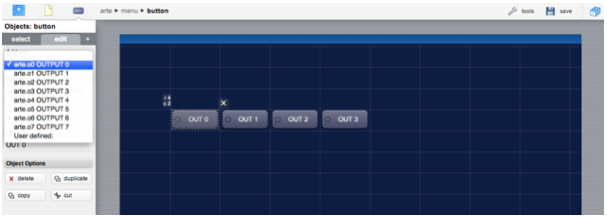Difference between revisions of "ArtecoOC"
| Line 1: | Line 1: | ||
| − | The ARTECOOC I/O Server can be used to interface HSYCO and the Arteco Next platform using the Arteco Open Connector SDK protocol. The current release of the I/O Server has been tested with the Arteco Open Connector protocol V6. It automatically handles connection and authentication to the OC server, and offers simple commands to send events and control output devices. | + | The ARTECOOC I/O Server can be used to interface HSYCO and the Arteco Next platform using the Arteco Open Connector SDK protocol. |
| + | |||
| + | The current release of the I/O Server has been tested with the Arteco Open Connector protocol V6. It automatically handles connection and authentication to the OC server, and offers simple commands to send events and control output devices. | ||
[[Category:I/O Server]] | [[Category:I/O Server]] | ||
Revision as of 14:13, 25 January 2016
The ARTECOOC I/O Server can be used to interface HSYCO and the Arteco Next platform using the Arteco Open Connector SDK protocol.
The current release of the I/O Server has been tested with the Arteco Open Connector protocol V6. It automatically handles connection and authentication to the OC server, and offers simple commands to send events and control output devices.
Contents
HSYCO Configuration
Add an ARTECOOC I/O Server in the I/O Servers section of the Settings and set its parameters:
Communication
- IP Address: host name or IP address of the Arteco Open Connector server
- IP Port: TCP/IP port to use, leave blank to use default port 80
- User: username
- Password: password.
High Availability
- Shutdown when inactive: defaults to false.
Options
| ID | Default | Values | Description |
|---|---|---|---|
| startupevents | false | true | generate IO events also during the driver’s start-up phase |
| false | start generating events only after HSYCO is aligned with the current status of the system | ||
| inputdiscovery | false | true | automatically creates the list of all inputs in the systemtopo.txt file. Should be enabled to allow the automatic update of (button) objects’ states |
| false | auto-detect for input devices is disabled | ||
| outputdiscovery | false | true | automatically creates the list of all outputs in the systemtopo.txt file. Should be enabled to allow the automatic update of (button) objects’ states |
| false | auto-detect for output devices is disabled | ||
| inputs | 8 | 0 ... 8 | use input pins from 0 to the specified value |
| outputs | 8 | 0 ... 8 | use output pins from 0 to the specified value |
Datapoints
The data points associated to the input pins are named “i0” to “i7”. The data points associated to the output pins are named “o0” to “o7”.
The I/O Server generates asynchronous events based on the status of the Arteco module’s input and output pins. The output data points can be written to control the output pins.
| ID | Value | R/W | Description |
|---|---|---|---|
| connection | online | R | connection established |
| offline | R | HSYCO can't connect to the panel | |
| i<n> | 0 | R | input <n> is low |
| 1 | R | input <n> is high | |
| o<n> | 0 | R | output <n> is low |
| W | set output <n> to off | ||
| 1 | R | output <n> is high | |
| W | set output <n> to on | ||
| flip | W | invert the status of output <n> | |
| blink | W | continuously blink output <n> | |
| pulse | W | set output <n> to on, then off after 1 sec. |
User Interface
When using the default settings of the Arteco I/O Server, all output pins are available in the Project Editor and can be easily associated to any control button of the Web interface.
You can also set the inputdiscovery option in order to associate control buttons to the module’s inputs: the control buttons will show the input status, and have no effect when pressed.
Release Notes
3.3.0
- initial release
ARTECO is a registered trademark of Arteco Srl.
